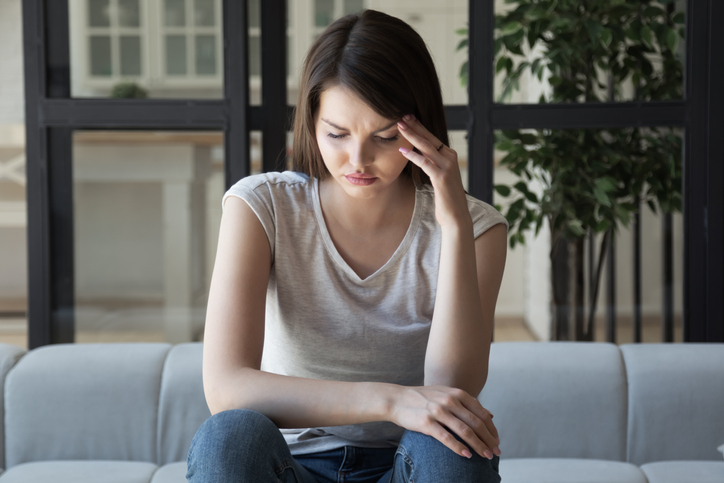We hear a lot about depression, but living with crippling anxiety is no joke. Feeling anxious can impact your ability to focus, function, sleep, eat and seriously affect your physical and mental health. Chronic anxiety or anxiety disorders can also lead to fatigue, digestive orders, panic attacks, and weakened immunity. Here are 16 lifestyle factors that could be making your anxiety symptoms even worse.
1. Major Life Changes

Going through a major life change or transition can cause stress and anxiety disorders. The loss of a job, divorce, relationship breakup, moving home and the death of a loved one is among the most stressful life experiences. Lean into your support networks or try therapy to help you through an anxiety-inducing change.
2. Lack of Sleep

Sleep deprivation, insomnia, and poor-quality sleep can affect your cognitive function, and physical and mental health and give you anxiety according to an expert article in CNN. Not getting enough sleep can also prematurely age you. Implement a bedtime routine, cut your screen time, and read or meditate before bed.
3. Unhealthy Behaviors

In times of chronic stress which can give you crippling anxiety, it’s easy to resort to self-sabotaging behaviors or self-medicate with alcohol, drugs, or overeating. Alcohol is a depressant and will make you even more anxious the next day. Find healthier ways to manage your anxiety like therapy, exercise, a clean diet, meditation and mindfulness.
4. Relationship Stress

Constant fighting or being in a toxic relationship can leave you a stressed-out and anxious mess. If your partner is physically or emotionally absent or worse abusive and therapy and communicating your needs aren’t working, it’s better to leave for your mental health and sanity.
5. Toxic Workplace

If you’re overloaded at work, your boss has set unrealistic expectations or the environment is toxic and unsupportive, this can cause severe depression and anxiety. Talk to HR about how to better manage your workload and get the support you need. And if it’s not there then it’s better to prioritize your mental health and get another job.
6. Gut Health

Dermatologist Dr. Carole Hazan suggests an unhealthy gut microbiome, when the good and bad bacteria in your gut are out of balance can impact the health of your skin and can also depression, anxiety, and other mental health issues. Lack of sleep, smoking, alcohol, stress and a diet that is high in fat, processed food and sugar can all throw your gut health out of whack which messes with your brain function and impacts your mood and emotions.
7. Constant Overthinking

Constant overthinking, and ruminating over perceived mistakes or worrying about the future will leave you in a state of severe anxiety. Most of what we fear doesn’t eventuate, so get out of your head. Mindfulness and living in the moment are the keys to overcoming a negative mindset.
8. Unhealed Trauma

Our past experiences, particularly from childhood and in unhealthy relationships can cause trauma and impact the way we show up in the world. Trauma lives and manifests in the body and left untreated it can cause anxiety, depression, mental health issues, and addiction.
9. Social Anxiety

Social anxiety disorder (SAD) is real. It’s a diagnosed mental disorder that causes people to feel intense fear of social situations and being judged, rejected, or embarrassed. If you feel worried or overwhelmed by social interactions and situations this can cause crippling anxiety. Try not to avoid all social settings, work on your self-esteem and confidence, and spend time with friends in more intimate settings.
10. Parental Worry

Parenting is a joy but it can also be one long anxiety-inducing journey. We all want the best for our kids, but parenting is hard at every stage and every age. Even when the kids grow up, the worry doesn’t stop. Concern over their relationships, life choices, education, mental health, and future can cause huge anxiety in parents.
11. Living in Fear

Fear is a natural emotion and being cautious is a survival instinct. When fear takes over your mindset and you become fearful of everything this negatively impacts your mental health and leaves you stressed and anxious. Cognitive-behavioral therapy (CBT), mindfulness, relaxation exercises, and therapy can help you overcome irrational fear.
12. Doom Scrolling

Excessive screen time and overexposure to negative news and social media can induce fear, anxiety, depression, and evoke feelings of inadequacy. Limit the amount of time you spend absorbing news or doom scrolling on your phone.
13. Extreme Perfectionism

When you place unrealistic expectations on yourself you are setting yourself up for failure and this fuels anxiety. There is no such thing as a perfect person, a perfect world, or a perfect relationship. Obsessively striving for perfectionism causes chronic stress and feelings of disillusionment and dissatisfaction. Silence that inner voice, and give yourself a break, we can only achieve so much in one day.
14. Sensory Overload

We live in a fast-paced world and the daily assault of stress, loud noises, bright lights, crowded spaces, social interactions, and clutter can cause sensory overload. When you are overstimulated and overwhelmed it can impair your ability to function, focus and this leads to anxiety. Take time out to quiet your mind, practice self-care, and reset.
15. Raging Hormones

Hormonal imbalances can impact your mood, and emotions, exacerbate anxiety, and trigger premature aging. When you are in a state of stress your body produces high levels of the stress hormone cortisol which can lead to mental health issues. Pregnancy, menopause, and poor gut health can all send your hormones haywire and leave you an anxious mess.
16. Financial Hardship

Not having enough money to pay your bills and constant stress over your financial future are major stress triggers that put you in a state of high anxiety. Find ways to cut back on your expenses, create a budget, or talk to a financial planner.




